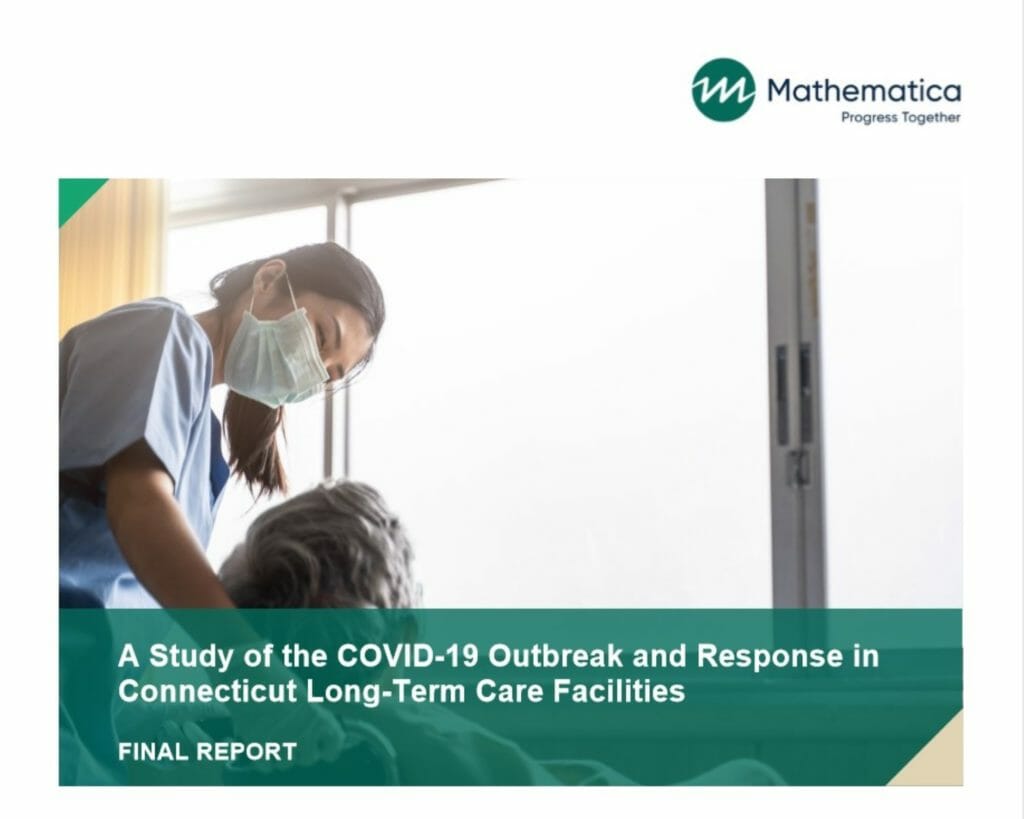
The Connecticut state government should have worked more closely with assisted living communities and nursing homes in the early days of the pandemic to “prevent the tragic loss of life,” according to the results of a new study of the state’s preparedness and response.
The final report from Princeton, NJ-based Mathematica Policy Research offers recommendations to prevent a potential second wave of COVID-19 and future infectious disease outbreaks, suggesting that Connecticut focus on reducing community spread and give long-term care a seat at the planning table.
“In an industry that is subject to extensive federal and state regulation, neither federal nor state governments provided clear guidance to nursing homes and assisted living facilities soon enough to prevent the tragic loss of life,” the report authors wrote.
Gov. Ned Lamont commissioned the study because long-term care residents account for almost three-fourths of all COVID-19-related deaths in the state. An interim report was released in August.

Key recommendations in the final report include developing a framework to guide policies on reopening long-term care facilities based on facility and community criteria rather than instituting a one-size-fits-all statewide visitation policy, and ensuring that all long-term care facility staff members have access to appropriate personal protective equipment and paid sick leave.
Specific to assisted living, Mathematica said participation in the Mutual Aid Plan, or MAP, should be mandatory for assisted living communities so that the state has access to important data, and that infection control training should be mandatory for assisted living staff members. Before the pandemic, Connecticut was one of only nine states without any specific regulations addressing infection control policies in assisted living communities, the authors said.
To prevent future outbreaks, Mathematica recommended, state associations for assisted living communities, nursing homes and home- and community-based services providers should participate in the state’s Long Term Care Planning Committee.
Mathematica analyzed facility and publicly reported data and interviewed a wide range of stakeholders for the report, including state agency staff, facility administrators, trade association representatives, labor representatives, legislators and family members.
The study authors found that the state’s existing reporting system could not fully support its needs in response to the pandemic. The state had to develop new systems and refine existing systems to monitor COVID-19 cases by facility type.
Before the pandemic, only 25% of assisted living communities were reporting information to the state’s LTC MAP portal, which was used to make decisions about PPE and resource allocation. As a result, PPE distribution favored nursing homes, which received 40% of all supplies, compared with home health and hospice (15%), assisted living (10%) and residential care homes (10%).
The study also found that the state’s emergency response operations plan focused exclusively on hospitals to the detriment of long-term care facilities. As a result, hospitals were the priority for emergency planning and response.
“Early efforts that focused on addressing the surge in demand for hospital resources hampered Connecticut’s preparedness and response to the pandemic outbreak in LTC facilities,” the report authors wrote. “LTC facilities were not recognized as critical healthcare assets in the state’s emergency preparedness plans, nor were LTC representatives at the table at the beginning of the outbreak.”
Friday, Lamont reacted to the report findings, saying: “[N]early all of the short-term recommendations provided to the state have already been implemented. I look forward to future discussions with the legislature, the industry, staff and families on the additional longer term recommendations brought forward.”
The review reportedly cost $450,000.
In other coronavirus-related news:
- The Florida RESET Task Force is recommending that essential businesses be exempt from COVID-19 liability and also recommends setting heightened culpability and evidentiary standards, a shortened statute of limitations and protections from employee COVID-19-related claims. The Florida SeniorLiving Association and Florida Assisted Living Association were part of the task force and support its recommendations.
- South Dakota Gov. Kristi Noem has called a special session of the state Legislature to meet this week, during which state lawmakers will give input on how the state could spend the remaining portion of $1.25 billion in federal COVID-19 relief. The state has until Dec. 30 to spend the record-breaking federal relief. The Legislature asks that another $115 million go towards grants for assisted living communities, nursing homes, residential treatment facilities, senior nutrition providers or services for those with intellectual and developmental disabilities.
- Michigan Gov. Gretchen Whitmer signed an executive order that includes recommendations from the Michigan Nursing Homes COVID-19 Preparedness Task Force to maintain protections for the state’s older adults living in congregate settings, including assisted living communities. The order maintains infection control protocols, protects residents from eviction and employees from retaliation for staying home when exhibiting viral symptoms, requires enhanced transparency and communication, and expands notification requirements.
- The Virginia Health and Human Resources Department formally committed $16 million for the purchase of up to 500,000 rapid COVID-19 antigen tests by the end of the year. The first order for 200,000 tests for roughly $6 million will be doled out to the state’s assisted living communities and nursing homes, according to the Virginia Department of Health.
- Texas public health officials admitted to data entry errors in reporting COVID-19 deaths at long-term care facilities, raising concerns about the implications of underreporting or misleading data from the Texas Health and Human Services Commission. The commission said it relies on facilities to provide data.
- A report from the White House Coronavirus Task Force says Oklahoma is among the worst states for positive coronavirus tests per 100,000 people. Oklahoma is in the red zone for virus cases with a rate of 201 new cases per 100,000 people, an increase of 15% from the prior week. The report recommends increased testing at senior living communities and nursing homes, as well as isolation of those infected, to limit the spread of the virus.
- Massachusetts Gov. Charlie Baker praised the senior living industry’s progress in reigning in the “devastating impact” of the pandemic during a speech last week at the Massachusetts Assisted Living Association’s virtual conference. Assisted living residences saw 2,000 COVID-19 cases between March and May. Since June, total resident cases have just surpassed 100.
- The Florida Senior Living Association has established the Justin Paul Brown Memorial Scholarship for Senior Living in honor of the long-serving board member who died from COVID-19 in September at age 45. It will provide a senior living community department coordinator, supervisor or director with full tuition to attend FSLA’s senior living annual conference.
- Pandemic safety protocols restricting visitation and off-site travel at long-term care facilities, and moving polling places away from personal care homes and nursing homes, are threatening to disenfranchise residents during the November election, according to a dozen community organizations across Pennsylvania.
- Older adults in Minnesota say they are maintaining a positive attitude and are determined to stay focused on good health even after months of living with the risks of the COVID-19 pandemic, according to a poll from Blue Cross and Blue Shield of Minnesota. Nine out of 10 poll participants reported feeling inspired to pursue at least one health goal. One in five report feeling lonely, anxious or depressed, and a majority of survey respondents said they fear a resurgence of COVID-19 cases.
- Although most USC Leonard Davis students had their internships pivot to a virtual setting during the pandemic, Nelson Rubio Argueta’s internship site, Kingsley Manor Retirement Community in Los Angeles, also was his home. Rubio Argueta, who completed his master’s degree in aging services management this year, lived among residents and facilitated activities to address loneliness during the lockdown.




